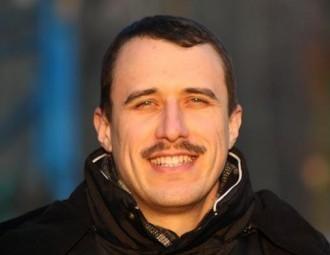Paval Sieviaryniets is released; the journalists who were to meet him were detained

On October 19 the leader of Belarusian Christian Democracy was released. At the Minsk railway station where he arrived a number of journalists were arrested.
Prominent opposition politician Paval Sieviaryniets, who was widely believed to be a political prisoner, was released on Saturday morning on completion of a three-year "restricted freedom" and corrective labour sentence in a correctional institution in the Brest region, BelaPAN reports.
The co-chairman of Belarusian Christian Democracy served the sentence in the village of Kuplin, Pruzhany district, working on a local farm and living in a dormitory-type facility.
As the 36-year-old Sieviaryniets told reporters after arriving in Minsk, he was awakened in his bed at about 3:30 a.m. by police officers, who told him to gather his things. He was driven to a railroad station where he was handed a ticket for a Brest-Moscow train. According to Mr. Sieviaryniets, police officers even carried his bags for him and the deputy chief of his open-type correctional institution said, smiling, that he would not be able to run for president because he had two convictions. Passengers on the train recognized him and expressed their support and asked him about the fate of other political prisoners.
“I am thankful to God for these three years because that was a spiritual journey,” Mr. Sieviaryniets said.
Nearly at the time of his arrival to the Minsk railway station, about a dozen of journalists were detained. They are were released 50 minutes after Paval Sieviaryniets had left the building of the station.
Born in Orsha, Vitsiebsk region, on December 30, 1976, Mr. Sieviaryniets graduated from the geography department of Belarusian State University in 2000. In October 1995, he joined the Belarusian Popular Front (BPF) and became leader of the party’s youth wing in February 1997. Sieviaryniets was elected co-chairman of Malady (Young) Front at the opposition youth organization’s founding conference in September 1997.
In the period between 1997 and 2004, Mr. Sieviaryniets was arrested more than 40 times, spent a total of more than seven months in jail and fined a total of some $3,500 for his role in street protests. He spent two months in detention following an opposition demonstration in April 1998 on a charge of "malicious hooliganism." In November 1998, the authorities dropped the criminal case against him under pressure from the international community.
Mr. Sieviaryniets spent 21 months in a correctional facility in the village of Malaye Sitna in the north of Belarus near the Latvian border between August 2005 and May 2007, serving a restricted freedom and corrective labour term for staging a series of unauthorized demonstrations in central Minsk in the fall of 2004 against the official results of that year's parliamentary elections and national referendum, which are widely believed to have been rigged. He was released on parole on May 22, 2007.
On May 16, 2011, Mr. Sieviaryniets, who was candidate Vital Rymasheuski’s campaign manager during the previous year’s presidential race, was convicted in connection with a post-election protest staged in Minsk on December 19, 2010. A district judge found him guilty of instigating disturbances and participating in them.
-
03.01
-
07.10
-
22.09
-
17.08
-
12.08
-
30.09








































